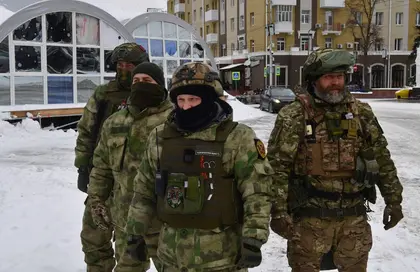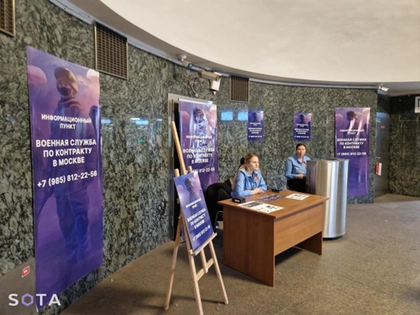His grey beard sticking out over a camouflaged coat, Andrei patrols the streets of Belgorod -- a Russian city regularly hit by Ukrainian strikes -- while his son fights with Moscow's forces across the nearby border.
Almost two years into Russia's military offensive in Ukraine, Belgorod is increasingly suffering in a conflict the Kremlin promised would not change lives at home.
JOIN US ON TELEGRAM
Follow our coverage of the war on the @Kyivpost_official.
On December 30, some 25 people were killed in a series of strikes on the city, the deadliest attack on Russian soil so far.
Attacks have escalated throughout the winter and damage is a common sight around the city of 340,000 people -- from bars with blown-out windows to the wrecked roofs of houses.
Andrei, 48, who goes by the codename "Dushman" and previously served in the military, is part of Belgorod's territorial defence force.
The region's crest -- a hawk and a lion -- was stitched onto his coat alongside the sign of the Soviet special forces.
"When there is a strike, we are the first to get there," he told AFP.
Most of Belgorod's territorial defence was posted to the border earlier in the offensive, to help the overstretched army watch for Ukrainian sabotage groups, he said.
But they have now mostly been moved to Belgorod itself -- some 40 kilometres (25 miles) from Ukraine -- amid the increasing attacks.
- Volunteer patrols -
Oleg Gerasimov, a truck driver who now leads a territorial defence unit, said his ranks had "filled up" with volunteers after the December 30 attack.

Latest on Russia’s Intransigence to End War Against Ukraine
They patrol the city in pairs, helping people get to safety and organising medical courses for civilians. While they have military-like attire, they are not armed.
The near constant attacks on Belgorod -- unthinkable when Moscow launched its offensive almost two years ago -- are a blow to the Kremlin.
Gerasimov acknowledged that things had not gone exactly to plan.
"The situation is, of course, difficult at the moment," he said.
"But we are hoping, believing, that the threat to our city and the whole country will end in the very near future."
With the second anniversary of the offensive looming, however, the conflict shows no signs of winding down. And Belgorod is looking increasingly vulnerable.
While the Kremlin has promoted a business-as-usual approach as troops fight in Ukraine, officials in Belgorod have organised some evacuations.
- 'Worry with every strike' -
The men of Belgorod's territorial defence were anxious.
"We are very worried for our city," said Andrei, a 36-year-old metal worker.
"We worry with every strike."
Many called for the army to push even further into Ukraine, saying Belgorod was exposed after Ukraine pushed Russian forces out of Kharkiv in September 2022.
Russia's Belgorod and Ukraine's Kharkiv -- around one and a half hour's drive apart -- were cities with historically close ties.
But the offensive ended that. Russian forces almost capturing Kharkiv in the first days of its advance.
"We need to push the enemy behind Kharkiv, then it will be calm in Belgorod," Andrei said.
Signs of a shaken city are abundant, with giant billboards showing videos of how to help wounded people.
In the city centre, an ice rink was shut after being damaged by one strike and a building stood riddled with holes from shelling.
There are also makeshift memorials to victims of the December 30 attack, one with a portrait of a young woman and children's toys.
That attack came as Russia intensified its own strikes on Ukraine.
- 'Shock' -
As he trudged through the snow between damaged buildings with bomb shelter directions on them, pensioner Anatoly Krolovetsky was still in shock from the attack.
He was at home at the time, the 69-year-old retired engineer recalled. "There were a few explosions in a row, very strong ones.
"And then something unbelievable: such a strong strike that I turned around and wanted to run, to hide," he said.
"But the waves of explosions were so strong they pinned me to the ground."
Living with the threat of attacks in Belgorod had become the norm, said Krolovetsky, who studied in Kharkiv.
"You go somewhere but you have to constantly look at the sky, maybe there's something flying there."
When the Kremlin launched its offensive in 2022, few in Belgorod believed the city could become so caught up.
"We thought they (Ukrainian forces) would be pushed and pushed," Krolovetsky said, still in disbelief.
Moscow needed to push back harder, he said.
"But you see how it turned out: they (Russian soldiers) came back to our border and are just sitting and waiting there."
You can also highlight the text and press Ctrl + Enter










